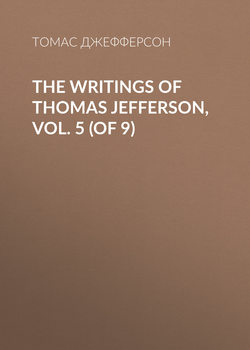Читать книгу The Writings of Thomas Jefferson, Vol. 5 (of 9) - Томас Джефферсон, Thomas Jefferson - Страница 82
TO GOVERNOR SULLIVAN
ОглавлениеWashington, June 19, 1807.
Dear Sir,—In acknowledging the receipt of your favor of the 3d instant, I avail myself of the occasion it offers of tendering to yourself, to Mr. Lincoln and to your State, my sincere congratulations on the late happy event of the election of a republican executive to preside over its councils. The harmony it has introduced between the legislative and executive branches, between the people and both of them, and between all and the General Government, are so many steps towards securing that union of action and effort in all its parts, without which no nation can be happy or safe. The just respect with which all the States have ever looked to Massachusetts, could leave none of them without anxiety, while she was in a state of alienation from her family and friends. Your opinion of the propriety and advantage of a more intimate correspondence between the executives of the several States, and that of the Union, as a central point, is precisely that which I have ever entertained; and on coming into office I felt the advantages which would result from that harmony. I had it even in contemplation, after the annual recommendation to Congress of those measures called for by the times, which the Constitution had placed under their power, to make communications in like manner to the executives of the States, as to any parts of them to which the legislatures might be alone competent. For many are the exercises of power reserved to the States, wherein an uniformity of proceeding would be advantageous to all. Such are quarantines, health laws, regulations of the press, banking institutions, training militia, &c., &c. But you know what was the state of the several governments when I came into office. That a great proportion of them were federal, and would have been delighted with such opportunities of proclaiming their contempt, and of opposing republican men and measures. Opportunities so furnished and used by some of the State Governments, would have produced an ill effect, and would have insured the failure of the object of uniform proceeding. If it could be ventured even now (Connecticut and Delaware being still hostile) it must be on some greater occasion than is likely to arise within my time. I look to it, therefore, as a course which will probably be to be left to the consideration of my successor.
I consider, with you, the federalists as completely vanquished, and never more to take the field under their own banners. They will now reserve themselves to profit by the schisms among republicans, and to earn favors from minorities, whom they will enable to triumph over their more numerous antagonists. So long as republican minorities barely accept their votes, no great harm will be done; because it will only place in power one shade of republicanism, instead of another. But when they purchase the votes of the federalists, by giving them a participation of office, trust and power, it is a proof that anti-monarchism is not their strongest passion. I do not think that the republican minority in Pennsylvania has fallen into this heresy, nor that there are in your State materials of which a minority can be made who will fall into it.
With respect to the tour my friends to the north have proposed that I should make in that quarter, I have not made up a final opinion. The course of life which General Washington had run, civil and military, the services he had rendered, and the space he therefore occupied in the affections of his fellow citizens, take from his examples the weight of precedents for others, because no others can arrogate to themselves the claims which he had on the public homage. To myself, therefore, it comes as a new question, to be viewed under all the phases it may present. I confess that I am not reconciled to the idea of a chief magistrate parading himself through the several States, as an object of public gaze, and in quest of an applause which, to be valuable, should be purely voluntary. I had rather acquire silent good will by a faithful discharge of my duties, than owe expressions of it to my putting myself in the way of receiving them. Were I to make such a tour to Portsmouth or Portland, I must do it to Savannah, perhaps to Orleans and Frankfort. As I have never yet seen the time when the public business would have permitted me to be so long in a situation in which I could not carry it on, so I have no reason to expect that such a time will come while I remain in office. A journey to Boston or Portsmouth, after I shall be a private citizen, would much better harmonize with my feelings, as well as duties; and, founded in curiosity, would give no claims to an extension of it. I should see my friends too more at our mutual ease, and be left more exclusively to their society. However, I end as I began, by declaring I have made up no opinion on the subject, and that I reserve it as a question for future consideration and advice.
In the meantime, and at all times, I salute you with great respect and esteem.
